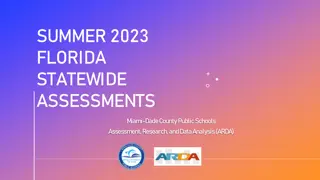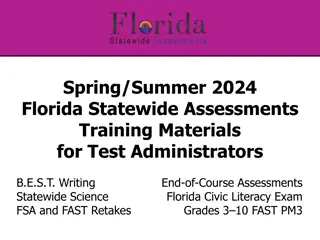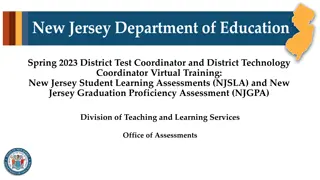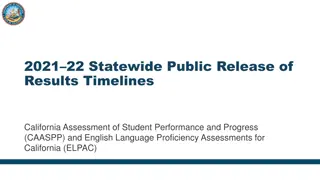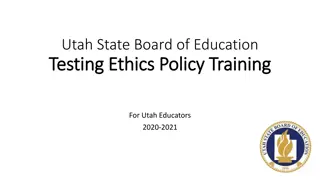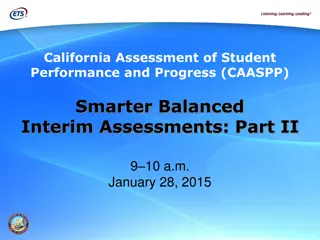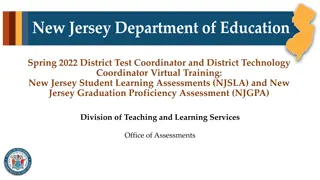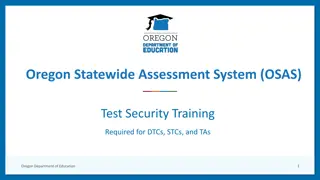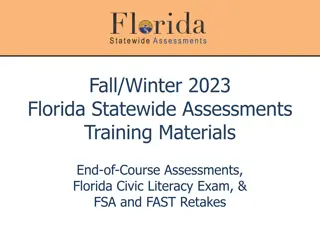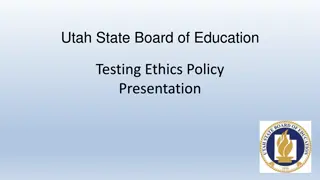Statewide Assessments Training Materials for Middle & High Schools
This training material focuses on test security review, policies, and procedures for statewide assessments in middle and high schools. It covers prohibited activities, reporting security breaches, handling secure test materials, and required agreements for personnel involved in test administration.
Download Presentation

Please find below an Image/Link to download the presentation.
The content on the website is provided AS IS for your information and personal use only. It may not be sold, licensed, or shared on other websites without obtaining consent from the author.If you encounter any issues during the download, it is possible that the publisher has removed the file from their server.
You are allowed to download the files provided on this website for personal or commercial use, subject to the condition that they are used lawfully. All files are the property of their respective owners.
The content on the website is provided AS IS for your information and personal use only. It may not be sold, licensed, or shared on other websites without obtaining consent from the author.
E N D
Presentation Transcript
Spring 2023 Statewide Assessments Training Materials Middle & High
Test Security Review Per Test Security Statute, s. 1008.24, F.S., and Florida State Board Rule, 6A- 10.042, Florida Administrative Code (FAC), inappropriate actions by school or district personnel can result in student or classroom invalidations, loss of teaching certification, and/or involvement of law enforcement. Examples of prohibited activities are: Reading or viewing the passages or test items before, during, or after testing Copying the passages or test items Revealing the passages or test items Explaining the passages or test items for students Changing or otherwise interfering with student responses to test items Copying or reading student responses Causing achievement of schools to be inaccurately measured or reported 2
Test Security Policies and Procedures Test administrators should report possible breaches of test security (e.g., secure test content that has been photographed, copied, or otherwise recorded) to the school assessment coordinator immediately. If a security breach is identified, the school assessment coordinator must contact the district assessment coordinator. For any test irregularities that require further investigation by the district, a written report must be submitted within 10 calendar days after the irregularity or security breach was identified. 3
Test Security Policies and Procedures Under no circumstances are students permitted to assist in preparing secure materials before testing or in organizing and returning materials after testing. After ANY administration, initial or make-up, all secure materials must be returned immediately to the school assessment coordinator and placed in locked storage. No more than three people should have access to the locked storage room. Secure materials must never be left unsecured and must not remain in classrooms or be taken off the school s campus overnight. The Test Materials Chain of Custody Form must be maintained at all times. 4
Test Security Policies and Procedures All personnel are required to sign and return a Test Administration and Security Agreement stating that they have read and agree to abide by all test administration and test security policies and procedures. Additionally, any other person who assists the school assessment coordinator, technology coordinator, or test administrator must sign and return an agreement. Test administrators must sign the Test Administrator Prohibited Activities Agreement, located in the manuals. Copy all agreements, file the copies, and return the originals in your Security Envelope. 6
Test Security Policies and Procedures Test administrators and Proctors must NOT administer tests to their family members. Students related to their assigned test administrator should be reassigned to an alternate test administrator. In addition, a student s parent/guardian should not be present in that student s testing room. Each test administrator is required to maintain an accurate Security Log, provided in the testing manuals. Anyone who enters a testing room for any length of time is required to sign the log. This applies to test administrators, proctors, and anyone who relieves a test administrator, even for a short break, regardless of how much time he or she spends monitoring a testing room. Copy all security logs, file the copies, and return the originals in your Security Envelope. 8
Test Security Policies and Procedures Proctors To ensure test security and avoid situations that could result in test invalidation, FDOE strongly discourages testing students in large groups (e.g., in a cafeteria or an auditorium). If students are tested in a large group, the appropriate number of proctors MUST be assigned to the room to assist the test administrator. Refer to the table below for the required number of proctors. * FDOE strongly recommends that proctors be assigned to rooms with 25 or fewer students whenever possible. 10
Test Security Policies and Procedures Proctors (cont.) School personnel and non-school personnel may be trained as proctors. Prior to testing, inform all proctors of their duties and of the appropriate test security policies and procedures. School personnel proctor duties may include preparing and distributing secure materials (e.g., test tickets). Non-school personnel may assist test administrators during test administration; however, they may NOT participate in any of the test administration procedures (e.g., distributing and collecting test materials, providing accommodations). Volunteers (e.g., parents, retired teachers) may be trained as proctors and may perform non-school personnel duties. 11
Test Security Policies and Procedures Missing Materials A written report must be submitted to the Bureau of K 12 Student Assessment within 30 calendar days after secure materials have been identified as missing. The report must include, as applicable: the nature of the situation, the time and place of the occurrence, the names of the people involved, copies of completed forms, a description of the communication between the district assessment coordinator s office and school personnel, how the incident was resolved, and what steps are being implemented to avoid future losses. 12
Test Invalidation Policies and Procedures 1. A student has an electronic device during testing. If a student is found with an electronic device that he or she is not using for testing purposes during testing or during breaks within a session, the student s test must be invalidated. 2. A student is cheating during testing. Cheating is cause for immediate test invalidation. Possible cheating situations include looking at and/or copying from another student s test, allowing another student to look at or copy from the student s test, or accessing unauthorized aids. In situations involving cheating, a report must be submitted to FDOE within 10 calendar days of the incident. 13
Test Invalidation Policies and Procedures 3. A student is not allowed the correct amount of time. If not enough time is given, invalidation decisions should be made based on whether the student was provided adequate time to respond completely to the test items. If the student feels he or she was provided enough time to respond completely, the test should be submitted for scoring. If too much time is given, discuss the situation with the District Assessment Coordinator. 4. A student becomes ill during testing. If a student reports after testing that he or she was ill during testing and was significantly affected, the test may be invalidated. If a student is unable to complete a session due to illness, the session may be completed on a subsequent day using the exact time that the student had remaining. 14
Test Invalidation Policies and Procedures 5. A student is given an accommodation not indicated on the student s IEP, Section 504 plan, or ELL plan. Testing with accommodations not indicated on a student s IEP, Section 504 plan, or ELL plan may be cause for invalidation. 6. A student was not provided an allowable accommodation indicated on the student s IEP, Section 504 plan, or ELL plan. The situation should be discussed with the student and his or her parents/guardians to determine if the lack of the accommodation significantly affected the student s performance and if the test should be scored. 15
Test Invalidation Policies and Procedures 7. A student is given an accommodation not allowed on statewide assessments. If a student is given an accommodation that is not allowed on statewide assessments and compromises the validity of the test, that student s test must be invalidated. 8. A student works in the wrong session. If a student working in session 2 goes back and works in Session 1, the test must be invalidated. 9. An error occurs in test administration procedures that could compromise the validity of test results. If the validity of the test results has been compromised (e.g., a student had access to an unauthorized visual aid that gave an unfair advantage), the test must be invalidated. 16
Test Invalidation Policies and Procedures 10. A disruption occurs during testing. If students are disrupted during testing due to a circumstance out of their control (e.g., severe weather), test invalidation may be considered if a student feels his or her performance was significantly affected by the disruption. 11. A student is disruptive during testing. If a student is disruptive during testing, the school assessment coordinator should determine whether invalidation is an appropriate course of action. 12. A student is given unauthorized help during testing. If a student received unauthorized assistance or has been given an unfair advantage (e.g., a test administrator has told a student to check the answer to a specific item), the student s test must be invalidated. 17
Test Invalidation Policies and Procedures For computer-based assessments, test invalidations are entered in TIDE. Invalidating a test will require the student s ID number and the reason for invalidation. For paper-based tests, grid the DNS bubble on the front cover of the test and answer book. If a DNS bubble is gridded by mistake, erase it completely and grid the UNDO bubble. Remember that invalidated paper-based tests should be returned with TO BE SCORED test and answer books in order to be counted for participation purposes. 18
Florida Statewide Assessments Grades 6-10 FAST Reading Grades 6-8 FAST Mathematics Grades 6-10 BEST Writing Field Test FSA Retakes (ELA and Algebra 1) BEST Algebra 1 EOC BEST Geometry EOC Biology 1 EOC Civics EOC U.S. History EOC Grade 8 Science
Test Administration Resources Policy Information Instructions Checklists Signs & Forms 20
Test Administration Resources TIDE User Guide TIDE Quick Guide Test Administrator User Guide TDS Quick Guide Accommodations Guide TA Certification Course *SCRIPTS Florida Assessment Portal www.fsassessments.org 21
Test Administration Schedule Session Lengths by Subject FSA Retakes (ELA & Algebra 1) The FSA ELA Writing Retake is administered in one 120-minute test session. The FSA ELA Reading & Algebra Retakes are administered in two 90-minute test sessions over two days. Session 1 must be completed before Session 2. Any student who has not completed a session by the end of the allotted time may continue working up to half the length of a typical school day. 22
Test Administration Schedule Session Lengths by Subject FAST Reading and Math FAST assessments have only 1 session. Students can only take one subject test per day. Any student who has not completed a session by the end of the allotted time may continue working up to the length of a typical school day. 23
Test Administration Schedule Session Lengths by Subject (cont.) BEST Algebra 1 and Geometry Biology 1, Civics, and U.S. History EOC Assessments These assessments are administered in one 160-minute test session in one day. Students finished after 80 minutes may be dismissed. Any student who has not completed a session by the end of the allotted time may continue working up to the length of a typical school day. 24
Test Administration Schedule Session Lengths by Subject (cont.) Grade 8 Science The Statewide Science Assessment for grade 8 is administered in two 80-minute test sessions in one day (PBT). BEST Writing Field Test The BEST Writing Field Test is administered in in one 120- minute test session with a 90-minute dismissal option. No additional time unless with accommodation. This is a computer-based test with no PBT accommodations. 25
Test Administration Schedule BEST Writing Field Test Schools 26
Test Materials Planning sheets FSA Writing Retake & BEST Writing Field Test ALL students taking the Writing tests will receive Writing Planning Sheets that they may use to take notes and plan their responses. The planning sheet is a one-page, letter-sized sheet. The front of the sheet is lined. Planning sheets are distributed to students at the beginning of the test session. Ensure that students have enough desk space to use their planning sheets. Used planning sheets are considered secure materials and must be kept in locked storage and returned in the District Assessment Coordinator ONLY box. 27
Test Materials CBT Worksheets FSA ELA Reading, Civics & U.S. History CBT Worksheets are one-page, letter-sized worksheets. Students may use the front and back of the worksheet to take notes. Worksheets are distributed to students at the beginning of each session for ELA Reading, Civics and U.S. History EOC assessments. Ensure that students have enough desk space to use their worksheets. Each student must be given a new worksheet for each ELA Reading test session. Used worksheets are considered secure materials and must be kept in locked storage and placed in the District Assessment Coordinator ONLY boxes. 28
Test Materials Four-function Calculators Grade 6 FAST Math includes a four-function calculator in the TDS, and handheld calculators are optional. Biology 1 includes a four-function calculator in the TDS, and handheld calculators are optional. Grade 8 Science students must be provided a handheld four- function calculator for both sessions of the test (PBT). 29
Test Materials Scientific Calculators Grades 7 8 FAST Math includes an online scientific calculator in the TDS. The BEST EOC s (Algebra 1 and Geometry) include an online scientific calculator in the TDS. The FSA Algebra 1 Retake includes an online scientific in the TDS for Session 2 only. Handheld scientific calculators are optional.
Test Materials Work Folders FSA Algebra 1 Retake & Biology 1 Students may use work folders to work the problems. The last page of the folder (back cover) is printed with graph paper. Each student must be given a new work folder for each test session. All used work folders are considered secure materials and must be kept in locked storage and returned in the District Assessment Coordinator ONLY box. Pens/Pencils & Scratch Paper Grades 6-8 FAST Math Students must be provided a pen or pencil and scratch paper to work the problems. Grid/graph paper may be provided as scratch paper. Scratch paper is considered secure materials and must be stored in a secure location after testing, and returned in the District Assessment Coordinator ONLY box. 31
Test Materials Reference Sheets & Periodic Tables are provided in an online format for computer-based testing. They are displayed in pop-up windows in their respective tests. Reference Sheets & Periodic Tables for students with paper-based accommodations are packaged with the test materials. Reference Sheets FAST Math Grades 6-8 BEST EOC s (Algebra 1 & Geometry) FSA Algebra 1 Retake Periodic Table Biology 1 32
School Assessment Coordinator Before Testing Preparation and Training You are responsible for training all test administrators and proctors, including non-school-based instructors (e.g., itinerant teachers). In the absence of sufficiently trained administrators, postpone testing until trained personnel are available. 33
School Assessment Coordinator Before Testing Preparation and Training (cont.) Test Administrators Test administrators must read and be familiar with all appropriate sections of the manuals. Test administrators who will be administering a test to students with accommodations must be trained in the use of those accommodations. Test administrators should refer to the Test Administrator Checklists, located in the manuals, before, during, and after testing. Test Administrators must check for and remove all unauthorized visual aids posted in classrooms or affixed to student desks prior to testing. 34
School Assessment Coordinator Before Testing Preparation and Training (cont.) Electronic Devices and Breaks Determine your school s policy for the storage of electronic devices during testing. Before testing begins, test administrators ask students to raise their hands if they have any electronic devices with them. Direct test administrators on what to do if students have electronic devices in their possession before testing begins. Ensure that test administrators are aware of the policy that students are not allowed to access electronic devices at any time during a test session, including breaks. If a student accesses his or her electronic device(s) during a break, his or her test must be invalidated. Ensure test administrators are aware of how to secure a student s computer or device during a break. For short breaks (e.g., restroom), it is recommended that a visual block be applied to the student s computer screen or device. For longer breaks, it is recommended that the student pause the test. 35
School Assessment Coordinator Before Testing Prepare for CBT Administration Ensure that all test administrators have active usernames and passwords to log in to TIDE. Test administrators will need access to the TA Interface in TIDE in order to administer tests. Work with your district assessment coordinator to ensure that all students are uploaded into TIDE. Verify that student eligibility is correct and that accommodations and test settings are correct. The Florida Education Identifier (FLEID) is now required. A student s social security number with an X or a 10-digit district number is no longer accepted. 36
School Assessment Coordinator Before Testing Meet with Technology Coordinator It is important that technology coordinators understand their responsibilities before, during, and after a computer-based test administration. The latest version of the secure browser must be installed on all computers or devices that students will use for testing. Review the instructions and information for technology coordinators, as well as all test administration and security policies and procedures included in the manual, with your technology coordinator and create a plan for handling issues during testing. 37
School Assessment Coordinator Before Testing Print Test Tickets Each student must have a test ticket to log in to computer- based assessments. See the TIDE user guides for instructions on generating and printing test tickets. Prior to computer-based test administrations, print test tickets to distribute to test administrators. Test tickets are considered secure materials and must be stored in a secure location before and after testing, and returned in the District Assessment Coordinator ONLY box. 38
School Assessment Coordinator Before Testing Assign Test Group Codes and Print PreID Labels For paper-based tests, each test administrator must be given one unique four-digit test group code to use in the testing room for each test administered. Each testing room must use a different test group code. Different unique test group codes must be used for make-up sessions. If a PreID label is not available, an On-Demand PreID Label must be printed and applied to the test and answer book. School staff may verify and apply labels no sooner than one week prior to testing. 39
School Assessment Coordinator Before Testing Required Administration Information Communicate to test administrators the process for collecting the required administration information, which includes the following: Students assigned to each testing room provide Student Names and Student FLEID Numbers Attendance information P=Present, A=Absent, W=Withdrawn, and P/I=Present but Invalidated Grade level Session ID or Test Group Code Accommodations provided AND accommodations used Signatures of test administrator and school assessment coordinator Unique security numbers of secure documents assigned to each student Dates and times when secure materials (e.g., test tickets, test and answer books, passage booklets) are received and returned After testing, copy all admin records, file the copies, and return the originals in your Security Envelope. 40
School Assessment Coordinator Before Testing Seating Charts Test administrators are required to maintain an accurate seating chart for each group of students in their rooms during testing. Arrows showing the direction the students are facing are now REQUIRED Create a new seating chart if the seating configuration changes during a test session. After testing, copy all seating charts, file the copies, and return the originals in your Security Envelope. 42
School Assessment Coordinator Before Testing Ensure Implementation of Accommodations Appendix A in each manual provides information concerning allowable accommodations for students with disabilities and for ELLs. When testing students with accommodations, prior planning is necessary to ensure that accommodations indicated on student IEPs, Section 504 plans, or ELL plans are implemented. Arrangements for implementing accommodations must be made prior to the administration dates. Make sure that test administrators have been properly trained regarding accommodations, and have made provisions for the exact accommodations needed for individual students to avoid test invalidations. 43
School Assessment Coordinator Before Testing Ensure Implementation of Accommodations (cont.) In TIDE, ensure the appropriate accommodations by selecting them on the student details page. This must be done before testing. Detailed instructions are given in the TIDE user guide. Accommodated scripts are available on the Florida Assessment Portal. 44
School Assessment Coordinator Before Testing Assessment Viewing Application (AVA) All test administrators who will administer the paper-based version of the FSA ELA Reading Retake test must be assigned the Assessment Viewing Application (AVA) Test Administrator role in TIDE. AVA contains audio content, Closed Captioning (CC), and American Sign Language (ASL) videos for ELA Reading listening items for students with paper-based accommodations. 45
School Assessment Coordinator During Testing Distribute Test Materials On each day of testing, you are responsible for providing each test administrator with the following test materials, as applicable: Test tickets Admin Record Security Log Seating Chart Planning Sheets/Work folders/Worksheets Test and answer books or special document materials (PBT) 46
School Assessment Coordinator During Testing Supervise Test Administration and Maintain Test Security Provide test administrators with additional materials during testing, as necessary. Monitor each testing room to ensure that test administration and test security policies and procedures are followed. You and the technology coordinator must be available during testing to answer questions from test administrators and to assist with technical issues. The test administrator must have a way to contact the school assessment coordinator or technology coordinator without leaving the room unattended. Ensure that Admin Records, Security Logs and Seating Charts are being completed properly and that all required administration information is being maintained in each testing room. 47
School Assessment Coordinator During Testing Supervise Test Administration and Maintain Test Security Submit Re-open a test session and Re-open a test requests in TIDE when necessary. The Invalidations & Requests Summary on the next slide is available on the Florida Assessment Portal 48
School Assessment Coordinator During Testing Monitor Student Progress Student progress and test completion rates for computer-based tests can be monitored in TIDE. School assessment coordinators should use Participation Reports in TIDE to track completion rates and determine which students still need to be tested. Further information on Participation Reports can be found in the TIDE User Guide. 50



